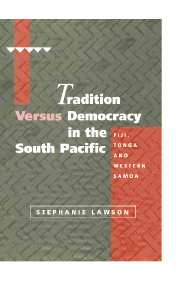Book contents
- Frontmatter
- Contents
- List of Maps
- List of Tables
- Preface
- Epigraph
- The South Pacific
- Introduction
- Chapter 1 Tradition and Democracy
- Chapter 2 Constitutional Development, Chiefly Power and the Politics of Tradition in Fiji
- Chapter 3 The Monarchy Versus Democracy in the Kingdom of Tonga
- Chapter 4 Preserving Tradition Through Democratization: The Introduction of Universal Suffrage in Western Samoa
- Chapter 5 Conclusion: Tradition Versus the West
- Notes
- Bibliography
- Index
Introduction
Published online by Cambridge University Press: 22 September 2009
- Frontmatter
- Contents
- List of Maps
- List of Tables
- Preface
- Epigraph
- The South Pacific
- Introduction
- Chapter 1 Tradition and Democracy
- Chapter 2 Constitutional Development, Chiefly Power and the Politics of Tradition in Fiji
- Chapter 3 The Monarchy Versus Democracy in the Kingdom of Tonga
- Chapter 4 Preserving Tradition Through Democratization: The Introduction of Universal Suffrage in Western Samoa
- Chapter 5 Conclusion: Tradition Versus the West
- Notes
- Bibliography
- Index
Summary
Throughout the Pacific, appeals to a reified concept of tradition, which incorporates such kindred concepts as culture, custom, ethnicity and identity, have been common for some time. These appeals have been used to serve a number of different purposes, depending on the context. Some of the ways in which the concept of tradition has been elevated have been seen as an appropriate and long-overdue response to the negative and racist images of Pacific peoples and their ways of life projected by Western colonialism in the region. One critic of colonialism, and a leading exponent of the romantic approach to traditional culture in the Pacific, stresses the negative aspects of the colonial legacy in these terms:
Pacific islands religions, economic systems and other key elements of culture were either suppressed or destroyed and replaced by European ones. This naturally led to the loss of self-respect and diminishing confidence among the Pacific Islanders, who thus developed a sense of inferiority while the Europeans increasingly became self-righteous, seeing Pacific islands traditions and cultures as primitive and outmoded … At constitutional independence … between 1962 and the 1980s, Pacific Islanders … began to reassert their eroding cultural identities and to reactivate some aspects of their lost or suppressed traditions and cultures in order to discover themselves once more.
The images evoked by memories of colonialism in the Pacific, and contemporary responses to it, are comparable to the post-colonial experience elsewhere.
- Type
- Chapter
- Information
- Tradition versus Democracy in the South PacificFiji, Tonga and Western Samoa, pp. 1 - 9Publisher: Cambridge University PressPrint publication year: 1996
- 1
- Cited by

